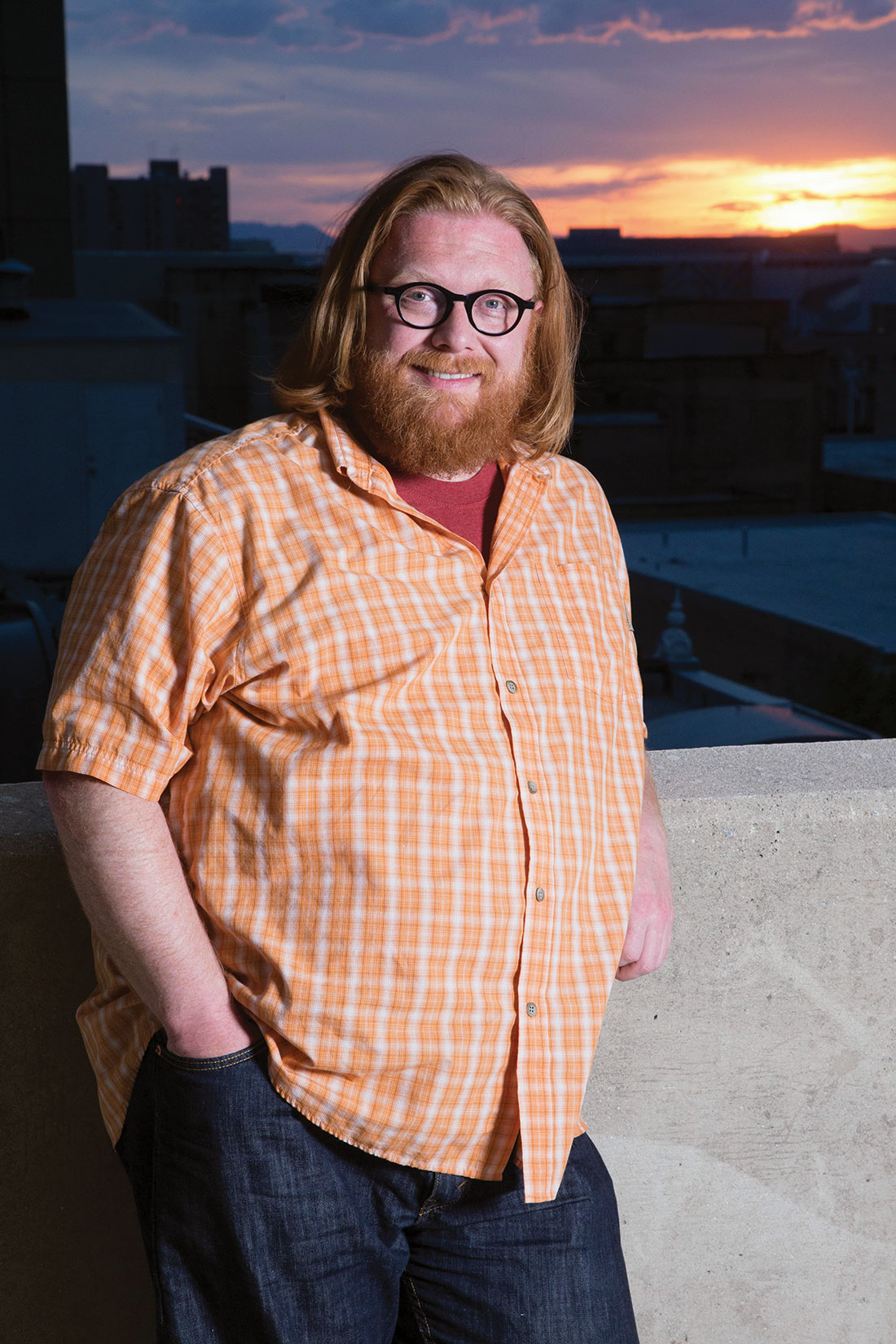
Advocate for Change

Dr. Scott Gust leads the charge on confronting privilege
by Autumn Thatcher (MSC ’15)
Professor Scott Gust is easily recognizable on Westminster’s campus. His bright-red
hair—often cut into an envy-inducing style—paired with chic glasses that tend to change
colors with the seasons make him easy to point out. In addition to his savvy sense
of fashion, Scott is making his mark on the college community through his dedication
to activism—primarily within the realm of diversity.
“It’s my life’s work,” Scott explains. “My contributions are in professional expertise
and through my personal identity and commitment. I focus what I do on building a more
diverse culture at the college.”
A Canadian native, Scott spent the early part of his career dazzling audiences through
musical theatre. Growing up gay in a small community meant that Scott experienced
a significant amount of harassment at school. He often skipped school to avoid bullies,
and when he did go, he would not drink anything in the mornings so that he wouldn’t
have to use the bathroom at school. His decision to pursue music stemmed from a desire
to be safe. “I had talent in music, but in retrospect, being in the arts was the only
place where people weren’t mean to me,” Scott explains.
Scott found his home in the performing arts, but ironically, it was a question posed
by the producer of a musical he was stage managing that led him back to the academic
realm. The producer was what Scott refers to as an ally of the gay community, yet
when watching an actor he had cast in his production, he asked,
“That guy is so talented, but how can I make him less gay?”
“The script was not specific about sexuality,” Scott says. “It was really hard for
me to figure out how to answer this question coming from a kind, supportive ally who’s
feeling trapped by this. I knew I wasn’t going to be able to answer those questions
if I stayed in musical theatre.”
It was not long before the theatre curtains closed for Scott, and he embarked on an
academic quest to answer the question, “How do we live this paradox where even good
people get positioned by culture to do bad things?” In his doctoral cohort at Southern
Illinois University Carbondale, Scott was one of 10 students—all of whom came from
diverse backgrounds. “I was tremendously fortunate to have been in those classes with
women of color, particularly women of color who were incredibly brilliant and had
such a powerful and generous orientation toward going to grad school together,” Scott
says. “I got to listen to them talk about what it meant to be a woman of color and
a mother of a black son. I got to be there when they engaged this complex theory of
race and gender and identity and culture. I got to be there when they processed what
that meant to them.”
He describes the experience as a pivotal moment in his life—one that triggered an
“aha” moment that led him to where he is today. “I thought it was unbelievable that
schlumpy old me got to be there to hear them talk about those things,” Scott says.
“It’s so breathtaking to be part of a community that has been built so intentionally,
to hear what women and men of color and immigrants think about when they read some
of the most powerful scholarly literature about power, privilege, and difference.
I had to figure out what my contribution is. I had an obligation to find ways to do
whatever I could to keep moving that discourse forward.”
Years later, Scott continues to move the discourse forward in his role as associate
dean of arts and sciences at Westminster. He also serves as the Title IX deputy coordinator.
He works hard to generate diversity awareness on campus and is recognized by students
and alums as a source of not only trust, but also acceptance. As Scott enters his
second decade at the college, he hopes to educate community members on how to confront
their privileges. “On the most direct and personal level, it means believing people
when they say things that don’t resonate with you. It starts in belief and disbelief,”
Scott says.
Scott believes that if community members can actively allow others to be heard—even
when the subject matter is painful to accept—and confront their own privileges, then
it’s a small step in the right direction toward positive change. “It’s asking questions
of what does it mean to believe outside of your own experience—and believing outside
of your experience,” Scott says. “In some ways, I think it’s profoundly hopeful and
profoundly humane.”
Favorite social justice organization: American Civil Liberties Union
Best TV show ever: The Golden Girls
Proudest athletic achievement: Alternate member of championship high school curling team
Most cherished mentor: Dr. Kathy Hytten, professor of educational leadership and cultural foundations, University
of North Carolina at Greensboro
Civil Rights heroines: Ella Baker and Sylvia Rivera
Favorite Westminster alum: You—totally you.
About the Westminster Review
The Westminster Review is Westminster University’s bi-annual alumni magazine that is distributed to alumni and community members. Each issue aims to keep alumni updated on campus current events and highlights the accomplishments of current students, professors, and Westminster alum.
GET THE REVIEW IN PRINT Share Your Story Idea READ MORE WESTMINSTER STORIES